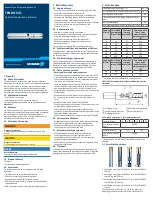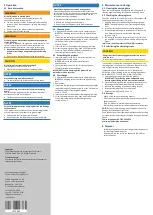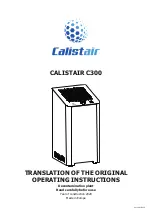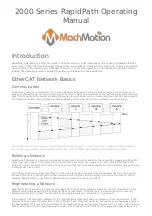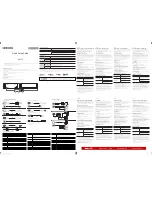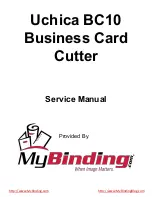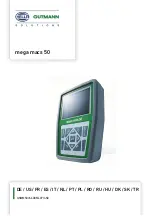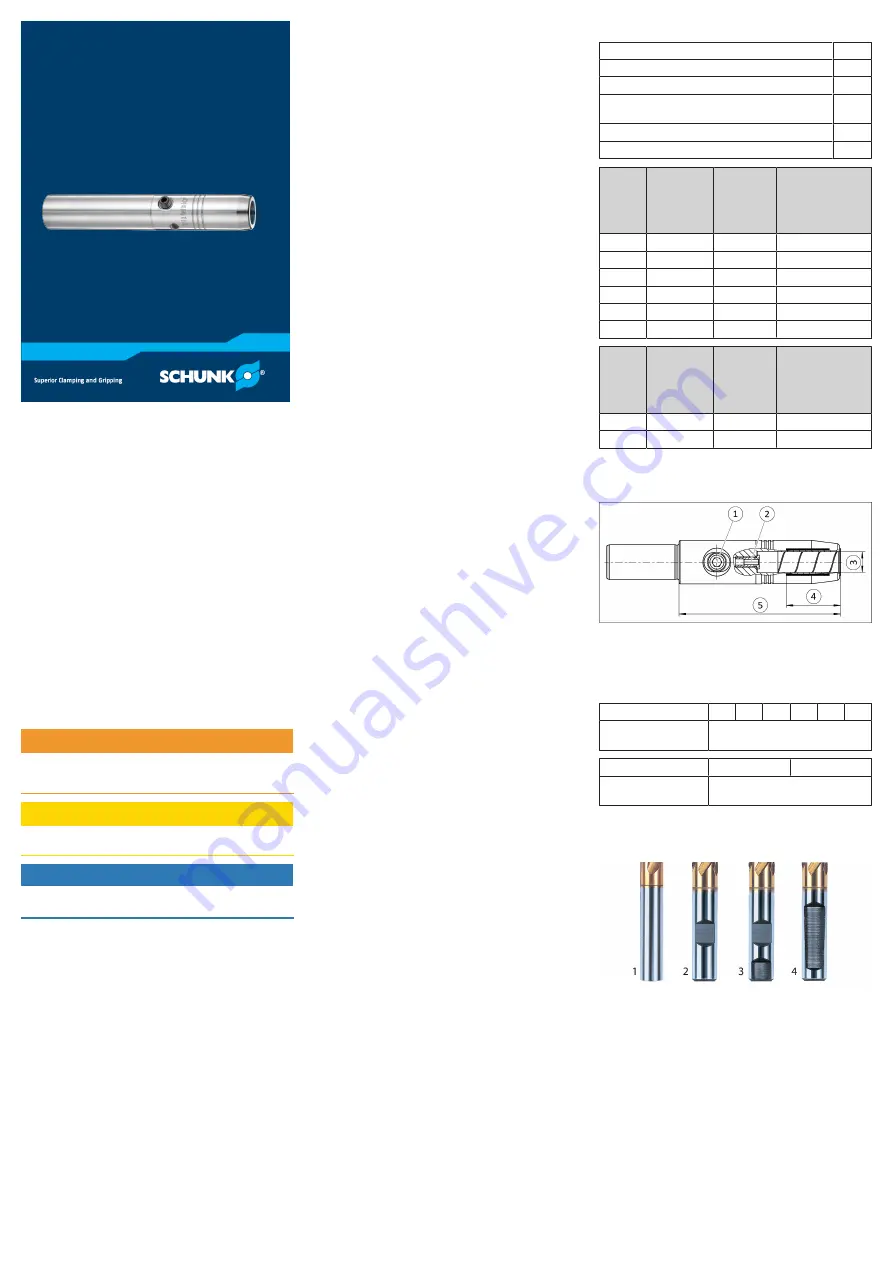
Assembly and Operating Manual
TENDO SVL
Hydraulic expansion extension
1 General
1.1 About this manual
This manual is part of the product and contains important
information for safe and correct use. It must be kept accessible
at all times. Personnel must have read and understood this
manual before starting any work. All safety notes and the
associated specifications in particular must be observed and
complied with. Illustrations may differ from the actual design.
1.2 Applicable documents
– General terms of business
– Catalog data sheet of the purchased product
The other applicable documents can be downloaded from
schunk.com
.
1.3 Warranty
The warranty is valid for 12 months from the date of delivery
from the production facility if the product is used as intended
and in compliance with the prescribed operating data.
Wear parts and parts that come in contact with the tool or
machine are not covered by the warranty.
1.4 Illustration of warnings
WARNING
Dangers for persons!
Non-observance can lead to irreversible injury and even
death.
CAUTION
Dangers for persons!
Non-observance can cause minor injuries.
NOTICE
Material damage!
Information about avoiding material damage.
1.5 Scope of delivery
– Product
– Assembly and Operating Manual
1.6 Accessories
The following accessories for the product are available
separately:
– Test shaft for monitoring the expansion rate
– Allen key for operating the clamping screw
– Hexagon socket wrench for length adjustment
– GZB-S intermediate sleeves for clamping several different
shank diameters
– GZB-S sleeve remover for removing intermediate sleeves
2 Basic safety notes
2.1 Appropriate use
– The product is used to clamp rotationally symmetric tools.
– The product is intended for industrial use.
– The product is designed for mounting in a toolholder. The
Assembly and Operating Manual of the corresponding
toolholder must be observed and complied with.
– The product may only be used and operated within the scope
of the technical data and the specifications in this
manual,
.
2.2 Inappropriate use
The product is not being used as intended if:
– The information in the technical data is not observed when
using and operating the product
.
– The product is combined with other extensions.
– The maintenance and storage instructions are not
.
– The product is used with heat shrinking technology.
2.3 Ambient conditions and operating conditions
The ambient and operating conditions must correspond or be
adapted to the version of the product and the specifications in
the technical data.
2.4 Structural changes, spare parts
Structural changes such as modification and reworking, e.g.
additional threads, bore holes or attachments, may only be
carried out with the written approval of SCHUNK. Only use
original spare parts and spares authorized by SCHUNK.
2.5 Notes on safe operation
–
Never combine multiple product extensions.
– The product must not be clamped without a tool above 25°C.
– Only use SCHUNK intermediate sleeves and always insert up
to the fixed backstop point. The use of intermediate sleeves
can reduce the transmittable torque.
– Long, projecting or heavy tools may only be clamped if the
speed of rotation is reduced according to the ambient and
operating conditions on site. The level of reduction is the
responsibility of the operator and must ensure safe operation
of the product.
– Maintain and service the product on a regular basis.
– Do not remove the air bleed screw (secured with pin or
resin).
– All repair work must be performed by SCHUNK.
– The operational safety and function of the product must not
be impaired by external influences.
– Follow the country-specific applicable safety, accident
prevention, and environmental protection regulations for the
application field of the product.
– Use mechanical screwdrivers only after approval by SCHUNK.
2.6 Personnel qualifications
– All operations may only be carried out by personnel that are
qualified and instructed for the respective operation.
– Personnel qualifications must comply with the on-site
country-specific requirements and laws.
2.7 Personal protective equipment
– When working on and with the product, follow the
respective country-specific legal requirements for
occupational health and safety, and wear the necessary
personal protective equipment.
– Follow country-specific accident prevention regulations and
the general safety notes.
2.8 Transport
To avoid product damage, the transport and handling of the
product must be adapted according to the version, weight and
packaging of the product. If necessary, use additional aids.
3 Technical data
Operating temperature range [°C]
20 – 50
Test temperature for the clamping force control [°C]
20 – 25
Max. coolant pressure [bar]
80
Adjustment travel of the length adjustment screw
[mm]
10
Tool shank tolerance
h6
Max. tightening torque of the clamping screw [Nm]
10 – 12
Clamping
Ø [mm]
Permissible
transmittable
torque* [Nm]
Minimum
clamping
depth [mm]
Permissible radial
force F on the
product at 50 mm
projecting length L1
[N]
6
16
27
113
8
23
27
185
10
45
31
270
12
90
36
325
16
165
39
705
20
300
41
920
Clamping
Ø [inch]
Permissible
transmittable
torque* [Nm]
Minimum
clamping
depth [mm]
Permissible radial
force F on the
product at 50 mm
projecting length L1
[N]
1/2
95
36
325
3/4
300
41
920
* Tool shank minimum tolerance h6, tool shank oiled
CAUTION! The loading limits of the spindle holder must be
observed!
① Clamping screw
④ Minimum clamping depth
② Length adjustment screw ⑤ Projecting length L1
③ Clamping diameter
Max. speed of rotation** for clamping diameter
Clamping Ø [mm]
6
8
10
12
16
20
Max. speed of rotation
[RPM]
10 000
Clamping Ø [inch]
1/2
3/4
Max. speed of rotation
[RPM]
10 000
** depending on the interface of the spindle and tool to be
clamped.
3.1 Permitted shank types
1. Shank type according to DIN 1835-1 form A and DIN 6535
form HA
2. Shank type according to DIN 1835-1 form B and DIN 6535
form HB (up to Ø 20 mm)
3. Shank type according to DIN 1835-1 form B and DIN 6535
form HB (from Ø 25 mm)
4. Shank type according to DIN 1835-1 form E and DIN 6535
form HE
Tool shanks with reliefs (type 2, 3 and 4) can impair the
balancing grade and concentricity of the overall system.

